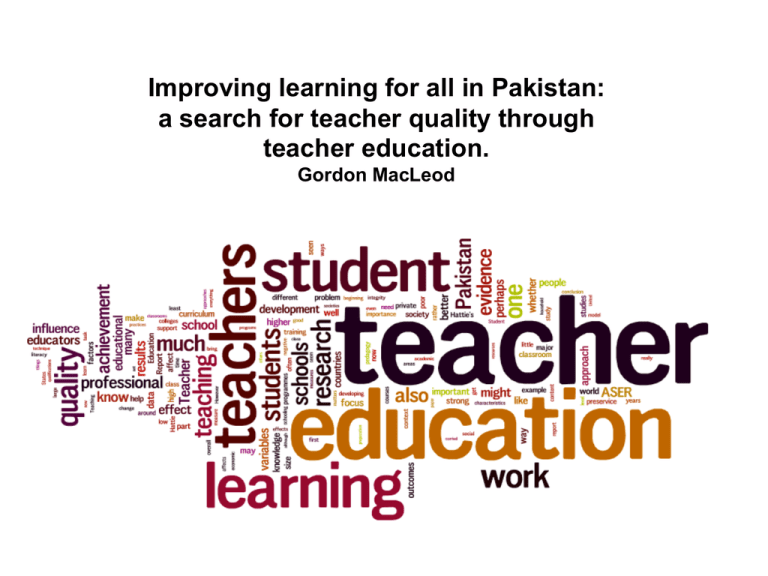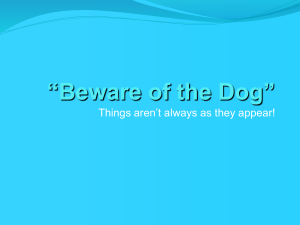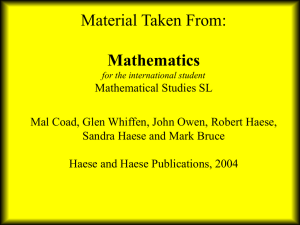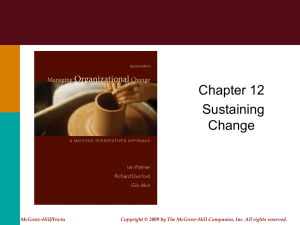Gordon MacLeod
advertisement

Improving learning for all in Pakistan: a search for teacher quality through teacher education. Gordon MacLeod Quality and equality in student learning The “problem” (from ASER, 2011) • quality of student learning is poor; • equality in student learning is low (girls; rural; public). Consequences of both aspects of the problem • Poorer societal well-being (economically, socially, individually--health, wealth, satisfaction, etc.) What relates to student learning? (Pakistan) Possible teacher and student “reasons” • Teachers’ poor quality; lack of attendance; lack of time in class; lack of knowledge; poor motivation; lack of integrity: lack of pedagogical content knowledge; lack of emphasis on “basics”; etc. • Student drop-out; lack of access; etc. • But… ASER primarily a household survey. Possibly associated with higher achievement • Household wealth; parental education level; being in certain regions/districts; private schools; tuition; consistent student attendance; being a girl (with access); etc. What is teacher quality? Four approaches • by teacher qualifications and credentials (e.g. B.A.); • by teacher characteristics (e.g. ages, gender); • by teacher processes (e.g. questioning); and • by student learning/outcomes. Student learning/outcomes approach • Most recent and fashionable. How much do students learn? What is the value added by teachers? • Leads to a type of high accountability, and ‘league tables’ of learning, both national and international. What relates to student learning? (Global) Thousands of studies • difficult even to keep up with • results sometimes appear confusing and even contradictory Meta-analysis • Set of (relatively simple) statistical techniques • Reduces results to a common measurement, an “effect size” e.g. “What is the effect of class size on student learning?” • “effect sizes” can be averaged across lots of studies to give single estimate. Therefore, very powerful synthesis is possible. What relates to student learning? (Hattie, 2009a) A synthesis of 800+ meta-analyses of student learning • over 50,000 separate research studies on student learning; • more than 200 million students involved; • 138 factors related to student learning (from 6 domains) – – – – – – child home school curricula teacher approaches to teaching. What relates to student learning? (Hattie, 2009a) Item Class size H, M or L Item Professional development Gender Providing formative (“feedback”) evaluation Homework Self concept Microteaching Socio-economic status Open versus traditional Teacher clarity Pre-school programmes Teacher training (PS) Principals/school leaders H, M or L What relates to student learning? (Hattie, 2009a) Item H, M or L Item H, M or L Class size L Professional H development Gender L Providing formative (“for H feedback”) evaluation Homework L Self concept M Microteaching H Socio-economic status M Open versus traditional L Teacher clarity H Preschool programmes M Teacher training (PS) L Principals/school L leaders What matters for student achievement? (Hattie, 2009b) Overall • Student domain accounted for about half of variance in student achievement. • Teachers and teaching accounted for one-quarter to onethird of variance in student achievement. • Principals (school leadership), schools, peers and home influences account for an average 5% or 6% each. • Taken together, teachers, teaching, school and school leadership account for 30-40% of variance • Meta-analysis requires cautious interpretation (see paper) Does preservice teacher education make a difference? • Paper reports on work in three ‘rich countries’ -USA, UK and Australia on preservice teacher education. • Much of writing about teacher education is rhetorical, driven by the political and ideological beliefs of vested interests. • Four agendas – Social justice – Professionalisation – Regulation – Deregulation What works in preservice teacher education? • Answer 1: Not a lot! • Answer 2: “… nowhere is there strongly conclusive evidence that preservice teacher education has a substantial measurable impact on teachers’ subsequent performances and student learning” • Answer 3: Perhaps subject-matter knowledge matters somewhat. • Answer 4: Professional development seems to work. Issues in Pakistani teacher education? Little is known about: • entrants to teaching—”the best and brightest?”; • teacher educators—”the best and brightest?”; • the Colleges—”somewhat dismal places”; • curriculum and processes—will NACTE be a mechanism for improving Pakistani teacher education and making more transparent the curricula and teaching processes of teacher education? • Outcomes are of substantial concern. Whither teacher education? • But what of the context? Who, if anyone, really cares? • Teacher education cannot address context issues that affect student learning e.g. access for girls; transparency and openness in assessment; etc. • Preservice teacher education has negligible apparent effects on student learning but professional development does. • Should we then abandon pre-service teacher education? Should we abandon preservice teacher education? A. Stages of becoming a teacher: • self-orientation and survival • then, task orientation • and only then, focus on impact, on student outcomes Beginning teachers have to be prepared for survival. What skills are needed for this? B. Also, students need to survive beginning teachers. A tentative model for teacher education Entry requires demonstrable subject-matter knowledge (an issue) Initial course: short, sharp, focussed—six weeks? (child development; classroom management; ethics; pedagogical skills, duty of care and “caring” skills e.g first aid) School-based placement with mentoring support. Subsequent blocks of intensive coursework. Primarily, a school-based approach based on principles of professional learning (e.g. Timperley, 2011) A tentative model for teacher education BUT, … No matter the model, Teacher education or teacher professional learning cannot succeed unless in a supportive environment of integrity, openness, honesty, and morality. Coda: the bit tacked on at the end • Beware of Greeks bearing gifts. Coda: the bit tacked on at the end • Beware of Greeks bearing gifts. • Beware of geeks bearing gifts. Coda: the bit tacked on at the end • Beware of Greeks bearing gifts. • Beware of geeks bearing gifts. • Beware of goras bearing gifts. Coda: the bit tacked on at the end • Beware of Greeks bearing gifts. • Beware of geeks bearing gifts. • Beware of goras bearing gifts. • Beware of globalisers bearing gifts. Coda: the bit tacked on at the end • Beware of Greeks bearing gifts. • Beware of geeks bearing gifts. • Beware of goras bearing gifts. • Beware of globalisers bearing gifts. Thank you








